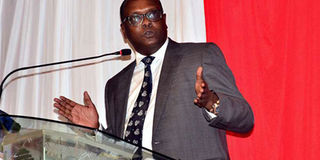Fresh probe into Sh88m Rio scandal

Former Sports Cabinet Secretary Hassan Wario, who is being investigated over the Rio Olympics scandal. PHOTO | FILE | NATION MEDIA GROUP
What you need to know:
- Detectives are seeking to establish whether there is evidence that the officials either misused or stole money allocated to the Kenyan team to Brazil in 2016.
- Sources revealed to the Nation that cash bonuses from Nike for Olympic and Commonwealth Games medal winners had never reached the athletes.
Former Cabinet Secretary Hassan Wario and Olympics legend Kipchoge Keino are among seven high-ranking officials to be investigated afresh in the Sh88 million Rio Olympics scandal.
The others are former Principal Secretary in the Ministry of Sports, Culture and Arts Richard Titus Ekai, former director of administration in the ministry Harun Komen Chebet, chief of the Rio mission Stephen Kiptanui arap Soi, former finance officer Patrick Kimathi Nkabu, and former National Olympics Committee Secretary-General Francis Kinyili Paul.
Detectives are seeking to establish whether there is evidence that the officials either misused or stole money allocated to the Kenyan team to Brazil in 2016, resulting in one of the most scandalous international outings in Kenya’s athletics industry.
A tribunal found that top officials in the Sports ministry had embezzled Sh88 million meant for air tickets to the games and recommended the prosecution of those found culpable.
TICKETS
The Rio de Janeiro 2016 Olympic Games Probe Committee discovered that the ministry had signed a ticketing deal with a local travel agency to provide air tickets at a much higher price than the national carrier, Kenya Airways, had quoted.
It showed that, while the National Olympics Committee of Kenya (Nock) had negotiated for a Sh175,000 bill per economy class return ticket to Rio, the travel company had increased the rate to Sh445,381.
Business class rates were quoted at Sh800,000 but the agency charged Sh2,028,385 per ticket.
The committee was formed by Dr Wario through Kenya Gazette notice number 7176 of September 9, 2016 to look into various issues regarding Kenya’s preparations for and participation in the games.
It was chaired by Mr Paul Ochieng, the dean of students at Nairobi’s Strathmore University, and included legendary marathon runner Ibrahim Hussein and former stars Elizabeth Olaba and Rose Tata-Muya.
Other members were Mr Elias Makori, a journalist, and Mr John Njogu, a lawyer at the ministry.
NIKE
In its report to President Uhuru Kenyatta in November 2016, the tribunal also expressed concern about the misappropriation of funds paid to Nock by American sportswear manufacturer Nike.
The firm supplies training and competition uniforms to Kenyan teams.
It also said Nock should account for the Sh126 million per year that it receives from Nike on behalf of athletes.
At the same time, it recommended the overhauling of an eight-year (2013-2020) contract between Nock and Nike as, the committee members found, it was heavily skewed in favour of the American sportswear manufacturer.
Despite a series of management blunders, Kenya bagged its biggest ever medal haul at the Olympics held in Brazil, winning six gold, six silver and one bronze medals.
This performance broke the previous record of six gold, four silver and four bronze medals at the 2008 Beijing Olympics.
BONUSES
At the height of the scandal, sources revealed to the Nation that cash bonuses from Nike for Olympic and Commonwealth Games medal winners had never reached the athletes.
Nike gives $15,000 (Sh1.5 million) to Nock for each gold medal won at the Olympic Games, $7,500 (Sh750,000) for silver and $5,000 (Sh500,000) for bronze.
“Even though the cash is payable to Nock, a large percentage of such bonus payment must trickle down to the individual athletes winning these medals,” a source privy to the discussions that led to the signing of the Nike deal with Nock said.
Kenyan athletes who have previously won Olympic medals told the Nation they had never been paid any Nike bonuses.




